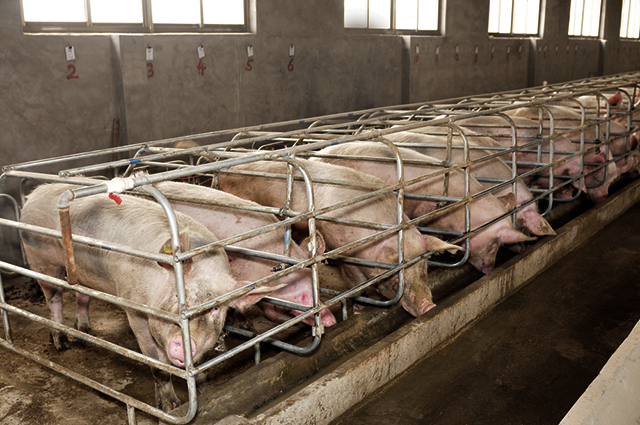
Truthout is a vital news source and a living history of political struggle. If you think our work is valuable, support us with a donation of any size.
As if the pork industry – complete with crowded “gestation crates,” abuse in slaughterhouses and grim conditions for pigs – wasn’t bad enough, many farms use a variety of feed additives to boost profits. While the law bars the use of hormones, that doesn’t mean pork produced conventionally is drug-free, and one of the most commonly used drugs is ractopamine, a growth stimulant. The beta-adrenergic agonist stimulates pigs to put on muscle, instead of fat, producing lean meat that’s more valuable per pound. For the agricultural industry, the economic bottom line is always the most important. Ractopamine is also used in cattle and turkeys as part of a cocktail of drugs and feed designed to push animals to grow as heavy as possible as quickly as possible.
But some 160 nations ban ractopamine, reflecting concerns about human exposure to the drug through meat consumption. Animal studies and observation indicate that the drug can be harmful for many pigs, who can develop heart palpitations and other complications as a result of high doses of the drug, while humans can experience what amounts of a heady shot of adrenaline when they’re exposed to it. In fact, the drug has arisen in the context of sports doping, where officials argue it could confer a competitive advantage – and some athletes barred for doping have claimed that ractopamine in their blood came from meat, not the deliberate consumption of the drug.
By and large, consumers are unaware that the compound is used in the production of their meat – farmers aren’t required to disclose it, and while labels like “natural” and “organic” are more tightly regulated, conventionally-produced meat can include a variety of additives without needing to alert consumers. Ractopamine, however, has been dragged into the labeling wars, this time by a pork producer who wanted to sell meat specifically labeled “ractopamine-free” and encountered resistance from both regulatory agencies and the pork industry. He won the fight to add the label to his products. But along the way, his case illustrated the giant gaps in food labeling law and consumer awareness, the additives the meat industry uses freely without disclosure and escalating battles over food labels.
Federal agencies are careful about food labeling, arguing that they don’t want to mislead consumers – for example, because hormones are banned in pork production, “hormone-free” is a misleading label that regulators fear could be used to prey on consumers who are worried about meat additives. Without knowing that hormones aren’t legal, they might be preferentially drawn to meat labeled as hormone-free, thereby offering such products a competitive advantage they hadn’t actually earned. Government agencies are similarly leery of labels like rGBH-free, another recent labeling controversy driven by dairy companies that wanted to advertise the lack of another common growth hormone. Likewise, GMO-free labels have attracted considerable controversy across the United States. By explicitly declaring that a product doesn’t contain a given additive, producers are implying that others do. In an era where consumers worry about what’s in their food, that creates what amounts to free advertising.
Consumers, however, argue that they have a right to know what’s in their food. Some worry about additives they can’t see, while others don’t know what their food contains and might be surprised to find out. Their calls for labeling push the industry to accommodate them, while federal agencies carefully consider whether they want to approve labels and what language food producers can use. Conventional farmers who don’t want to stop using agricultural drugs push back, concerned about possible loss of income.
The case of rGBH is perhaps one of the most striking illustrations of the labeling wars and a surprising win. When dairies first began agitating for the label, regulators were resistant, finally approving it with the warning text that “no significant difference” had been observed between milk produced with or without the hormone. However, the appearance of the label on the scene pushed other members of the dairy industry to follow suit, because consumers started specifically asking for milk that didn’t contain the growth hormone. While the two milks might not have been chemically different, consumers clearly had concerns about the ethics of using hormones and the living conditions for cows stimulated to produce high volumes of milk.
In the case of ractopamine, an additive many consumers were blissfully unaware of until recently, concerns involve not just conditions for pigs, but also human health risks. Nations that have chosen to ban meats produced with the drug argue that there’s not enough information about whether it can be used safely in humans. Ultimately, the push for labeling might not be what drives the pork industry to abandon ractopamine use: One of the biggest customers for US pork is China, which bans the drug, and producers cannot afford to raise pigs that can’t be sold overseas.
Holding Trump accountable for his illegal war on Iran
The devastating American and Israeli attacks have killed hundreds of Iranians, and the death toll continues to rise.
As independent media, what we do next matters a lot. It’s up to us to report the truth, demand accountability, and reckon with the consequences of U.S. militarism at this cataclysmic historical moment.
Trump may be an authoritarian, but he is not entirely invulnerable, nor are the elected officials who have given him pass after pass. We cannot let him believe for a second longer that he can get away with something this wildly illegal or recklessly dangerous without accountability.
We ask for your support as we carry out our media resistance to unchecked militarism. Please make a tax-deductible one-time or monthly donation to Truthout.